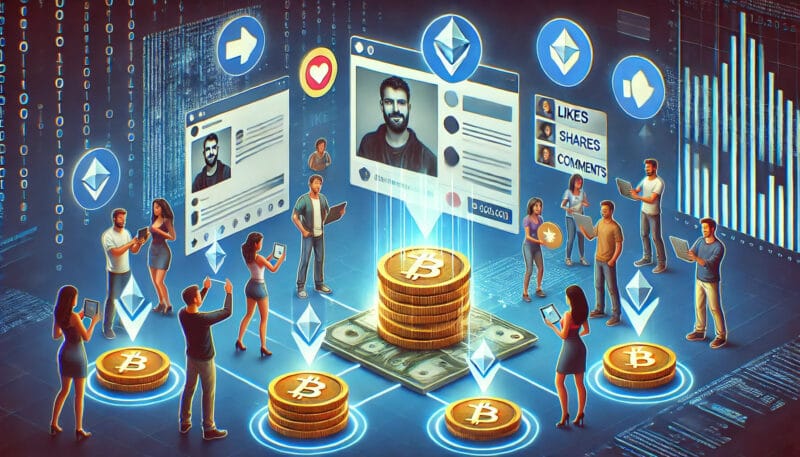Over the past decade, social media has changed how we communicate and share information. Platforms like Facebook, Twitter, and Instagram have shaped our digital lives. However, concerns about data privacy, centralized control, and censorship continue to grow. Many users now want alternatives where they can control their data and content. This is where decentralized social media platforms come in. Powered by blockchain technology, these platforms aim to offer more privacy, ownership, and transparency. They free users from the centralized control of tech giants.
Here’s how decentralized social media platforms will transform online interactions.
1. What Are Decentralized Social Media Platforms?
Decentralized social media platforms run on blockchain technology. Unlike traditional platforms, they don’t rely on a single entity to manage content. Instead, control is distributed among users. Blockchain technology ensures that content, data, and interactions are securely stored across a decentralized network.
Key Characteristics:
- Blockchain-Based: Blockchain secures user data, interactions, and content, ensuring that no one can tamper with or misuse the data.
- User-Controlled: Users own their data and content, deciding how it’s shared or monetized.
- No Central Authority: These platforms operate without a single company or entity controlling the content.
Example:
Mastodon and Steemit are early examples of decentralized social platforms. Mastodon operates as a decentralized alternative to Twitter, while Steemit rewards users with cryptocurrency for creating and engaging with content.
2. Why Decentralized Social Media Platforms Are Needed
Centralized social media platforms are facing increasing criticism. Data privacy breaches, censorship, and the misuse of personal information have become frequent concerns. Users want more control over their data, better privacy, and freedom from censorship.
Key Issues with Centralized Platforms:
- Data Breaches: Centralized platforms collect huge amounts of user data, making them prime targets for hackers.
- Censorship: Traditional platforms often censor content based on policies, algorithms, or government pressures.
- Limited User Control: Users lack real control over their data and how the platform uses it.
By contrast, decentralized platforms provide a better alternative:
- Privacy: Blockchain keeps user data secure and private.
- Freedom from Censorship: Without a central authority, decentralized platforms give users more freedom to express themselves.
- Data Ownership: Users keep control over their personal information and how it’s shared.
Example:
The Cambridge Analytica scandal in 2018 revealed how Facebook allowed third parties to misuse user data. This incident sparked more demand for decentralized platforms where users control their data.
3. How Blockchain Empowers Decentralized Social Media
Blockchain technology provides the foundation for decentralized social media platforms. It creates a secure and transparent system for users to store and share data without relying on a central entity. Every post, interaction, and piece of content is recorded in blocks that are linked together and secured.
Key Blockchain Features for Social Media:
- Security: Blockchain’s cryptography ensures that data remains secure and safe from unauthorized access.
- Transparency: Users can verify how their data is used since all interactions are recorded on a public ledger.
- Decentralized Storage: Rather than storing data on centralized servers, blockchain distributes data across a network of nodes, preventing any single point of failure.
Example:
The platform Minds uses blockchain to reward users with cryptocurrency for engaging with content. The platform also ensures transparency in content moderation, helping users understand how and why content is flagged or removed.

4. The Future Benefits of Decentralized Social Media Platforms
Decentralized social platforms will offer many benefits that centralized platforms simply cannot. They will give control back to the users, promoting a more democratic online environment.
Key Benefits:
- Content Ownership: Users retain full ownership of their content and data, deciding how it is monetized and shared.
- Monetization Opportunities: Platforms that reward users with cryptocurrency offer new ways for content creators to earn income.
- Censorship Resistance: Decentralized platforms are more resistant to censorship and manipulation because they don’t rely on a central authority.
- Community-Driven Development: Users shape the future of the platform through decentralized governance, encouraging innovation and better user experiences.
Example:
On the platform BitClout, users invest in social tokens linked to creators. As a creator’s popularity grows, the value of their token increases. This decentralized model allows creators to benefit directly from their online activity without relying on advertisers or corporate control.
5. Challenges Facing Decentralized Social Media
Despite their potential, decentralized social media platforms face challenges. Mass adoption remains difficult due to technical limitations and user habits.
Challenges:
- Scalability: Decentralized platforms must improve to handle millions of users without slowing down or becoming too expensive to run.
- User Experience: Many platforms still lack the user-friendly interfaces that attract mainstream users.
- Governance: Managing disputes, moderating content, and making platform-wide decisions without a central authority can be complicated and slow.
- Competition: Convincing users to leave established platforms like Facebook or Instagram requires strong incentives, given the convenience of those platforms.
Example:
Diaspora, a decentralized social media platform, struggled to gain traction due to its complex user interface and difficulty in competing with tech giants like Facebook. While it has loyal users, it remains niche.
Wrapping Up: The Future of Decentralized Social Media
Decentralized social media platforms represent a significant shift in how we think about online interactions. They offer more freedom, privacy, and control than centralized platforms ever could. Although challenges like scalability and user experience remain, the benefits of decentralization—such as data ownership, freedom from censorship, and user-driven development—make these platforms a promising alternative to traditional social networks.
As blockchain technology advances and users become more concerned about privacy and data security, decentralized social media platforms will likely grow, shaping the future of digital communication.
For more insights and detailed guides on the future of social media, visit our Decentralized Social Media Guides.
Stay Updated
For the latest updates on decentralized social media platforms and blockchain technology, follow us on:
Stay informed with the latest strategies and insights in the world of decentralized technology at FreeCoins24.io.
Special Offer
Ready to explore decentralized social platforms? Sign up on Bybit today and enjoy up to $30,000 in deposit bonuses. Join the decentralized movement with confidence!

















